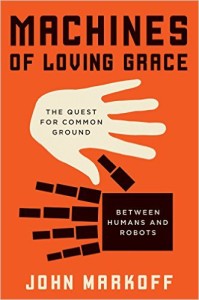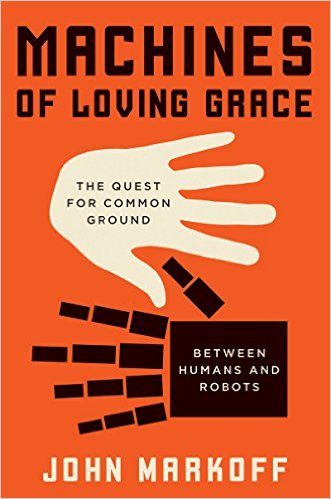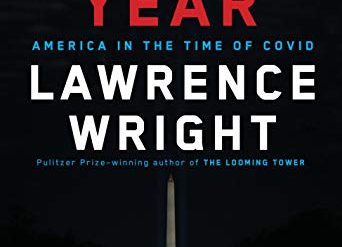
In 1967, Richard Brautigan, the patron saint of hippiedom, published a poem in a collection under a title copied for this book. In the poem’s final stanza, he envisioned a world run by robots that to so many readers then must have seemed entirely fanciful:
I like to think
(it has to be!)
of a cybernetic ecology
where we are free of our labors
and joined back to nature,
returned to our mammal
brothers and sisters,
and all watched over
by machines of loving grace.
Machines of Loving Grace: The Quest for Common Ground Between Humans and Robots by John Markoff ★★★☆☆
Now, Pulitzer Prize-winning New York Times technology and science reporter John Markoff examines Brautigan’s vision in the light of nearly fifty years of technological development. His conclusion? Ambiguous. However, one thing emerges clearly: “just as personal computing and the Internet have transformed the world during the past four decades, artificial intelligence and robotics will have an even larger impact during the next several.”
Markoff is unclear what that impact will be. He describes the enduring debate about the consequences of automation, which came to the fore in popular media in the 1950s. The question, of course, is whether robots will displace humans — and ultimately even eliminate us! — or simply expand our capabilities. Some of today’s most audacious thinkers, including Stephen Hawking, Bill Joy, and Elon Musk, have issued dire warnings about the dangers inherent in the possibility of runaway automation, while others such as Ray Kurzweil welcome the prospect with open arms, even claiming the potential for human immortality in advancing machine intelligence.
Our aging population will help determine the future of work
So far, however, the facts are equivocal despite predictions that automation eats jobs: “between 1990 and 2010 [as the computer microprocessor and the Internet came of age] the overall workforce in the United States increased by 21 percent.” It’s worth adding, as Markoff does at a later point, that “The Bureau of Labor Statistics projections now predict that U.S. job growth will be primarily influenced by the aging of American society, not by technological advances that displace and create jobs.”
Tracing the history of automation back to its roots in the 1940s, Markoff describes a long-running debate between the proponents of artificial intelligence (AI) and intelligence augmentation (IA). In contemporary terms, this dichotomy can be described as a contrast between Google’s self-driving car, which needs no human intervention (AI), and Apple’s Siri, an iPhone utility that assists rather than supplants human effort (IA). Although the debate stems from philosophical disputes going back centuries, Markoff identifies the two poles of this argument with two men who figured prominently in the early days of the Information Age: Douglas Engelbart, whose work prefigured Apple’s Macintosh and consistently points toward IA, and John McCarthy, an academic who was one of the founders of AI.
Hundreds of influential players
This is a complex story, with scores if not hundreds of players. Markoff does his best to give credit where it is due to so many of the brilliant innovators who figure in the tale. He might have done better, though, to focus on a few key characters whose work has proved seminal in the light of history: Engelbart and McCarthy, for sure, but also Norbert Wiener, J.C.R. Licklider, Andy Rubin, and Sebastian Thrun, for example.
All four men (and, admittedly, dozens more) figured prominently in the rise of robotics: Wiener, the mathematician and philosopher who originated the study of cybernetics; Licklider, the legendary director of DARPA (the Defense Advanced Research Projects Agency), which funded so much of the baseline work in robotics (as well as the Internet!); Rubin, a standout Silicon Valley developer who built Google’s now huge robotics business; and Thrun, a computer scientist who led the team that won the 2005 DARPA Robotics Challenge and later founded Udacity, the first major presenter of MOOCs (Massive Online Open Courses). Markoff might have singled out many others — but not so many others!
Are you familiar with the old saying, “You can’t tell the players without the program?” Well, that might apply to Machines of Loving Grace. Markoff’s encyclopedic knowledge of the computer industry gets in the way of clarity here.
For related reading
Check out 20 good nonfiction books about the future and 30 good books about artificial intelligence.
You might also enjoy Science explained in 10 excellent popular books.
If you enjoy reading nonfiction in general, you might also enjoy:
- Great biographies I’ve reviewed: my 10 favorites
- My 10 favorite books about business history
- 20 top nonfiction books about history
- The 10 most memorable nonfiction books of the decade
And you can always find my most popular reviews, and the most recent ones, on the Home Page.



























